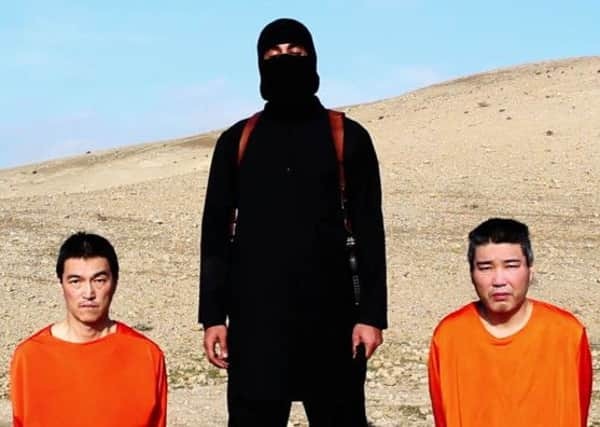IS militants demand $200m for Japanese hostages


An online video allegedly from the group shows a militant threatening to kill two hostages unless a ransom of US $200 million (£132 million) is paid within 72 hours.
Mr Abe vowed to save the men, saying: “Their lives are the top priority.”
Advertisement
Hide AdAdvertisement
Hide AdHowever, Mr Abe declined to say if Japan would pay the ransom for the captives, identified in the extremist video as Kenji Goto Jogo and Haruna Yukawa.
The video, made by IS’s al-Furqan media arm and posted on militant websites associated with the extremist group, mirrored other hostage threats it has made. Japanese officials said they would analyse the footage’s authenticity.
“It is unforgivable,” said Mr Abe, on a six-day visit to the Middle East with more than 100 government officials and presidents of Japanese companies. He added: “Extremism and Islam are completely different things.”
In the video, the two men appear in orange jumpsuits with a rocky hill in the background, a masked militant in black standing between them.
The scene resembles others featuring the five hostages previously beheaded by the Islamic State group, which controls a third of Iraq and Syria.
“To the prime minister of Japan: Although you are more than 8,000 and 500 kilometres from the Islamic State, you willingly have volunteered to take part in this crusade,” says the knife-brandishing militant, who resembles and sounds like Jihadi John, the British militant in other filmed beheadings.
“You have proudly donated $100m to kill our women and children, to destroy the homes of the Muslims … and in an attempt to stop the expansion of the Islamic State, you have also donated another $100m to train the (apostates).”
The comments refer to money Mr Abe pledged while in Egypt to help Iraq’s government and aid Syrian refugees. Mr Abe said he would send Yasuhide Nakayama, a deputy foreign minister, to Jordan to seek the country’s support and to resolve the hostage crisis.
Advertisement
Hide AdAdvertisement
Hide AdHe added that the Israeli government is sharing information to aid in the latest hostage drama. The Israeli prime minister’s office declined to comment.
Speaking in Tokyo, chief cabinet secretary Yoshihide Suga also declined to say whether Japan would pay the ransom.
“If true, the act of threat in exchange of people’s lives is unforgivable and we feel strong indignation,” Mr Suga said. “We will make our utmost effort to win their release as soon as possible.”
Mr Yukawa, a 42-year-old private military company operator, was kidnapped in Syria in August after going there to train with militants, according to a post on a blog he kept. Pictures on his Facebook page show him in Iraq and Syria in July. A video showed him holding a Kalashnikov assault rifle with the caption: “Syria war in Aleppo 2014.”
“I cannot identify the destination,” Mr Yukawa wrote in his last blog post. “But the next one could be the most dangerous.” He added: “I hope to film my fighting scenes during an upcoming visit.”
Nobuo Kimoto, an adviser to Mr Yukawa’s company, told Japanese TV station NHK he had worried “something like this could happen sooner or later”, saying: “I was afraid that they could use Yukawa as a card.”
IS has beheaded and shot dead hundreds of captives – mainly Syrian and Iraqi soldiers – in its sweep across the two countries, celebrating its killings in graphic videos. The group beheaded British captives David Haines and Alan Henning and US hostages James Foley, Peter Kassig and Steven Sotloff.
It still holds British photojournalist John Cantlie, who has appeared in other extremist propaganda videos, and a 26-year-old American woman captured last year in Syria while working for aid groups. US officials have asked that she not be identified due to safety fears.
Advertisement
Hide AdAdvertisement
Hide AdThe video marks the first time an IS group message has publicly demanded cash. The extremists asked for $132.5m from Mr Foley’s parents and political concessions from Washington, though neither granted them in months of negotiations.
SCOTSMAN TABLET AND IPHONE APPS